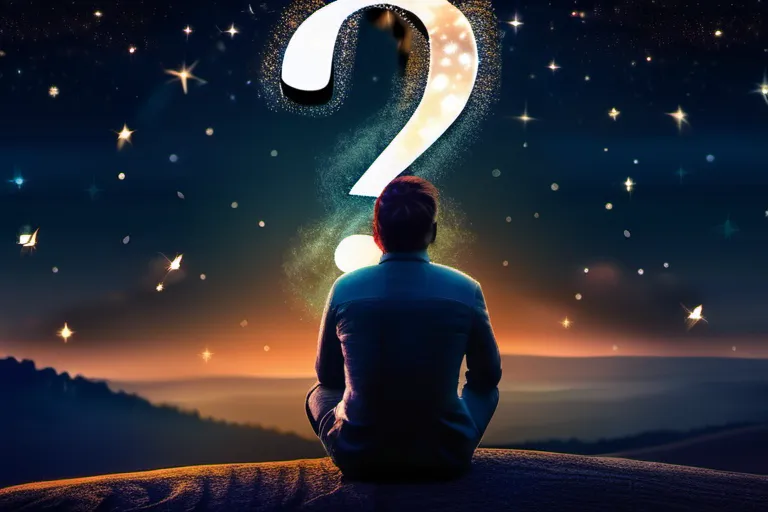Explore philosophical, spiritual, and scientific perspectives on life’s purpose.
Delve into a profound exploration of one of humanity’s most enduring questions: What is the meaning of life? This article will examine various theories from philosophy, religion, science, and beyond to provide a comprehensive understanding of this complex topic.
The Philosophical Quest for Meaning
Unraveling the enigma of life’s meaning has been a timeless quest for philosophers, stretching across centuries and cultures. How can we truly understand our purpose in this world?
Existentialism offers one path. This philosophy posits that individuals are responsible for giving their lives meaning through choices and actions. In the absence of a predetermined purpose, existentialists believe that life is inherently meaningless unless we define it ourselves. ‘Is life’s meaning something we must create, or is it just an illusion?’ pondered Jean-Paul Sartre.
Nihilism provides another perspective. It challenges the very notion of meaningfulness by suggesting that there is no inherent purpose in existence. For nihilists, all values and beliefs are ultimately baseless. This can lead to a profound sense of despair or indifference. ‘Does our struggle matter if everything is ultimately meaningless?’ asks the adherent of this dark philosophy.
Hedonism stands as a contrasting viewpoint. It advocates for maximizing pleasure and minimizing pain as the primary purpose of life. While hedonists may find joy in simple pleasures, the long-term consequences can be bleak. ‘Is it all about immediate gratification, or do we seek deeper fulfillment?’ wonders one who ponders this philosophy.
The quest for meaning through existentialism, nihilism, and hedonism reflects a broader human dilemma: How do we navigate the complexities of life without being overwhelmed by its uncertainties? Each perspective offers valuable insights but leaves us with more questions than answers. Is there a way to reconcile these differing viewpoints in our search for a meaningful existence?
The journey through these philosophical theories highlights the profound nature of questioning one’s place in the universe. It challenges us to reflect on what truly matters and invites us to engage deeply with the complexities of human existence.
Religious Perspectives on Life’s Purpose
Religion, like a lighthouse guiding ships through stormy seas, has long offered solace and direction to those seeking meaning in life. In the vast ocean of human existence, religions such as Christianity, Buddhism, and Islam provide beacons that illuminate paths toward purpose.
In Buddhism, one might ask, ‘What is the ultimate goal?’ The answer often revolves around achieving enlightenment or Nirvana, a state of liberation from suffering and rebirth. This concept can be likened to breaking free from the cycle of an endless, dreary sea, finding a way onto dry land where one can finally breathe freely.
Christianity, with its emphasis on faith in Jesus Christ as the savior, offers a different perspective. Here, the meaning of life might be summarized as serving God and loving others as oneself. This idea of a loving God who created us for a purpose is akin to finding one’s role in a grand play, where every character has a part that contributes to the whole.
In Islam, life’s meaning is often framed within the context of submission to Allah and living according to His will. The journey towards this submission can be seen as climbing a steep mountain, each step bringing one closer to a panoramic view of divine guidance and purpose. This path is not just about reaching the peak but also about the journey itself, filled with challenges that build character.
Each religion interprets life’s meaning differently through its own lens—Christianity through salvation, Buddhism through enlightenment, Islam through submission. Yet, despite their differences, all offer a framework for understanding one’s place in the world and how to live a fulfilling life. By exploring these perspectives, we can gain deeper insights into the enigma of our existence.
Scientific Approaches to Understanding Life
As we delve into the realm of scientific approaches to understanding life’s purpose, it’s almost as if we are peering through a telescope at distant galaxies, each one holding clues about our place in the cosmos. How can science help us unravel this enigma? Let’s explore some intriguing theories that might provide insights.
Evolutionary biology offers one perspective, suggesting that life’s purpose is inherently tied to survival and adaptation. What if every creature on Earth is just an actor in a grand play of natural selection? Charles Darwin’s theory of evolution by natural selection posits that organisms that are better adapted to their environment survive and reproduce more successfully than those less well-adapted. Could this be the key to understanding life’s meaning, as driven by the relentless force of evolution?
Cosmology, too, provides a unique lens through which we can view the purpose of life. The Big Bang theory tells us that the universe began with a colossal explosion and has been expanding ever since. Could our existence be merely a fleeting moment in this vast cosmic tapestry? Scientists like Stephen Hawking have pondered whether our lives are mere blips on the screen of an unimaginably old and complex cosmos.
Quantum physics adds another layer to our understanding, introducing concepts such as superposition and entanglement. Does quantum mechanics hint at a universe where everything is interconnected on a fundamental level? Some theorists propose that the observer plays a crucial role in shaping reality, suggesting that consciousness might be integral to the fabric of existence itself.
In these scientific theories, we see a fascinating interplay between the deterministic and the chaotic, the material and the ethereal. Each theory provides a different piece of the puzzle, but none give us a complete picture. It’s as if we are still at the beginning of an epic journey to understand the meaning of life.
The Role of Humanity in the Cosmos
Imagine humanity as a tiny speck floating in the vast expanse of the cosmos, a mere blip on the timeline of the universe’s grand tapestry. But what does this insignificant existence mean? Are we truly just accidents of fate, or do we hold some profound significance within the larger context?
The question of humanity’s role in the cosmos is both humbling and exhilarating. It challenges us to look beyond our immediate surroundings and consider the broader implications of our existence. From the search for extraterrestrial life to the impact we have on our own planet, this inquiry invites us to reflect deeply.
Our quest for life elsewhere in the universe is not merely a scientific endeavor; it’s also a profound exploration into our place within the cosmos. The discovery of even a single form of alien life could shift our perspective entirely—revealing that we are not unique and perhaps not so insignificant after all. It might even suggest that there are other civilizations out there grappling with similar questions about purpose and meaning.
On Earth, too, humanity has left an indelible mark. Our impact on the environment is a testament to our power as a species. But this same power also offers us the opportunity for redemption and stewardship. Can we find ways to coexist harmoniously with nature, ensuring that future generations inherit a planet not just preserved but enriched?
As we navigate these complex questions, it becomes clear that understanding our role in the cosmos is deeply intertwined with personal growth and self-realization. By exploring our connection to the universe, we may find new ways to define what gives life meaning—whether through scientific discovery, spiritual contemplation, or simply the act of living fully and responsibly.
So, as we ponder our place among the stars, let us not forget that each one of us has a part to play in this cosmic drama. Whether through science, spirituality, or personal growth, finding meaning is an ongoing journey—one that continues to unfold with every sunrise and starlight.
Personal Growth and Self-Realization
How many times have you wondered, ‘What’s my purpose?’ It’s like trying to find your way through a dense forest without a map—every path seems promising yet leaves you more confused. Personal growth and self-realization are like planting seeds in the fertile ground of one’s soul. Just as a seed needs nurturing to bloom, so do we need to tend to our inner selves to understand our true purpose.
Philosophers have long debated the nature of personal growth. Kant, for instance, believed that self-realization comes from understanding and acting on your moral duties. But what if morality is subjective? Can our purpose be found in purely individual pursuits or should we consider our impact on others and the world around us?
In spirituality, finding meaning often involves connecting with something greater than oneself. This could mean aligning yourself with a deity, nature, or even the collective unconscious. But does this external connection truly define your purpose? Or is it about discovering what makes you you, irrespective of these broader influences?
From a scientific perspective, personal growth might be seen through the lens of psychology and neuroscience. Cognitive behavioral therapy suggests that changing our thought patterns can lead to significant life improvements. But this approach is more about fixing problems than finding meaning—does it really address the deeper questions of existence?
The journey towards self-realization isn’t just about understanding who we are, but also about how we want to grow and contribute to the world. It’s like being a detective in your own life story, piecing together clues from past experiences, present feelings, and future aspirations. The more you explore these facets, the clearer your purpose may become.
Ultimately, the meaning of life is as unique as each individual, yet shared in the common threads of human experience. As you embark on this journey of self-discovery, remember that there’s no one-size-fits-all answer. Your path to personal growth and self-realization could be a winding road or a straight shot towards your destination—it all depends on how you choose to travel.
The Future of Life’s Purpose
As we delve into the future of life’s purpose, it becomes clear that our understanding may shift dramatically. With technological advancements like artificial intelligence and quantum computing on the horizon, the very fabric of existence could be redefined. Could these developments rewrite the script of what ‘meaning’ means?
The quest for knowledge has long driven humanity’s progress, but in a post-scarcity society where basic needs are abundantly met, our drive might find new expressions. Imagine a world where the pursuit of meaning is not just about survival or personal gain, but about creating something truly beautiful and harmonious. Space exploration offers another vista: as we venture further into the cosmos, we may find answers to questions that have long eluded us—about our place in the universe, our role within it.
Will these journeys into the unknown give us new perspectives on what life means?
The integration of spirituality with technology might also play a crucial role. As technologies become more ingrained in daily life, they could enhance rather than detract from spiritual practices, allowing for deeper connections and greater insights. The interplay between science and mysticism could create new paradigms that are both rational and transcendent.
Moreover, as we embrace the potential of a post-scarcity society, where resources are abundant, our focus might shift towards more communal goals. This could mean exploring new forms of community living, shared prosperity, and collective wellbeing. The question becomes: what kind of world do we want to create, and how can technology help us achieve it?
The enigma of life’s purpose may not be resolved by any single approach, but through a fusion of philosophical, spiritual, and scientific perspectives. As we move forward, the future could hold endless possibilities for unraveling this grand mystery.
Conclusion
 By examining multiple perspectives on the meaning of life, we can gain valuable insights into our own existence and purpose. Ultimately, the answer may be unique for each individual, but understanding these theories can help us find our own path.
By examining multiple perspectives on the meaning of life, we can gain valuable insights into our own existence and purpose. Ultimately, the answer may be unique for each individual, but understanding these theories can help us find our own path.











